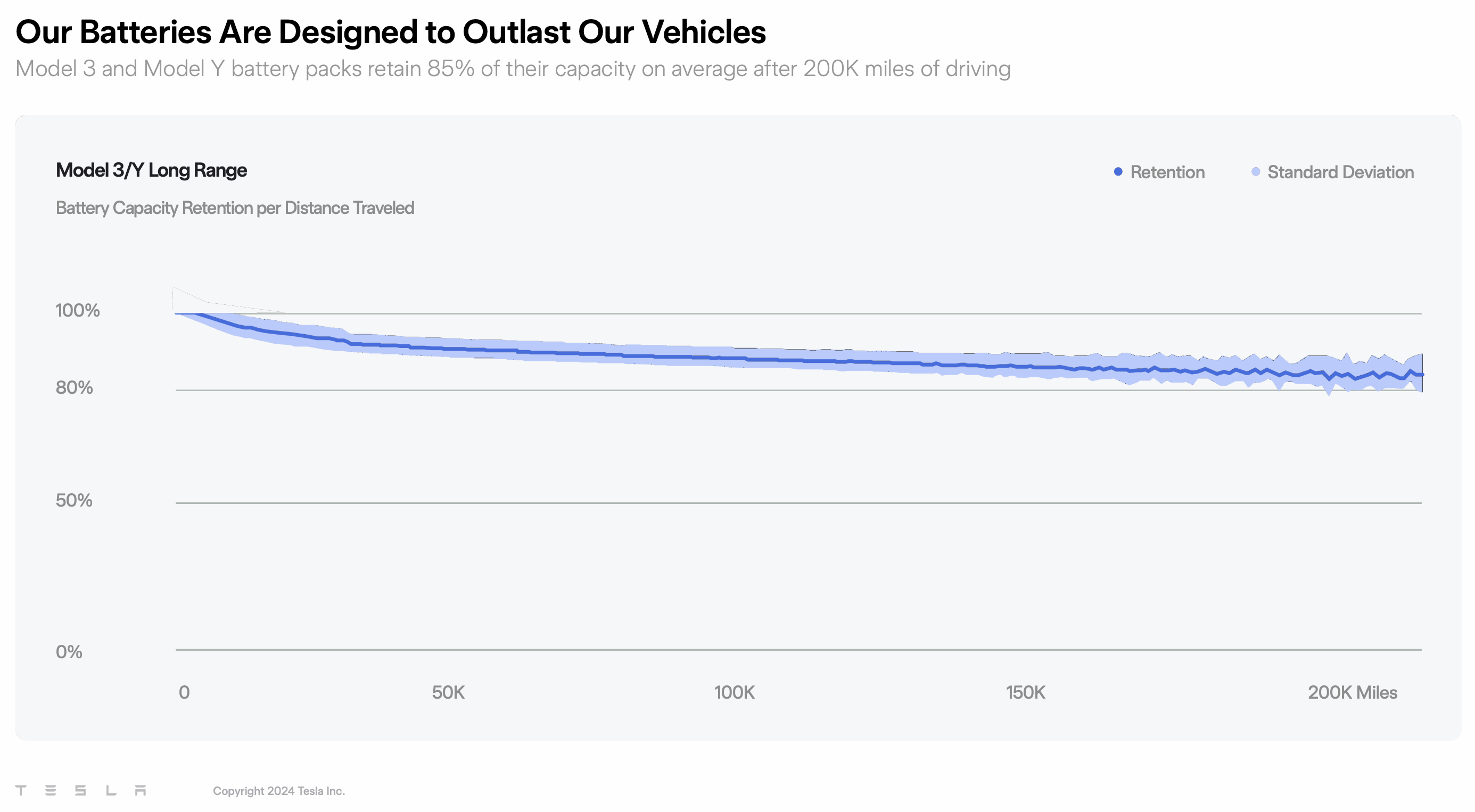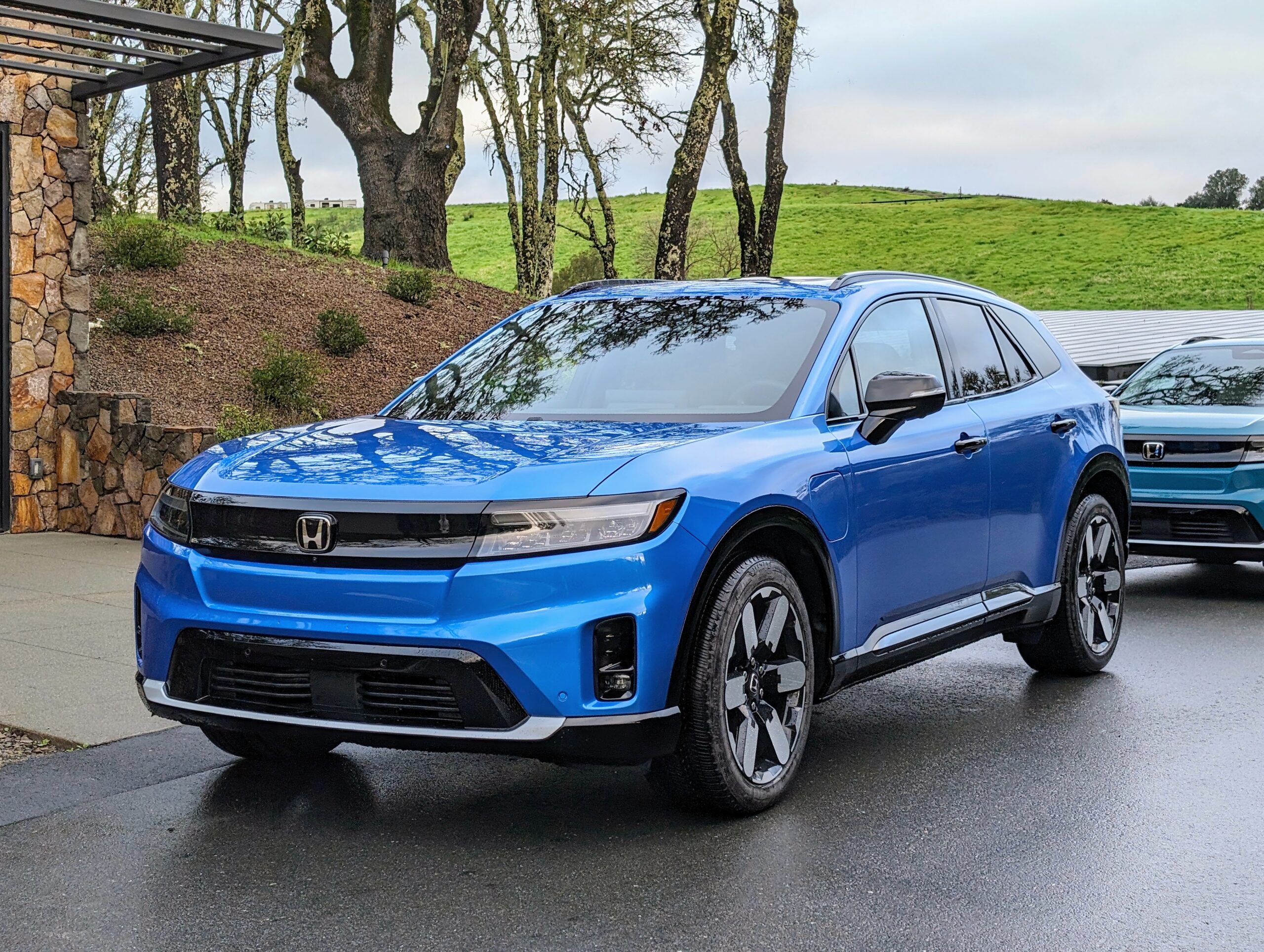London, 18 August, 2023, (Oilandgaspress) : EVX Public Charging Study uses data from the PlugShare charging app to gain what J.D. Power describes as a “view into the overall experience” of public charging at Level 2 and DC fast-charging stations. J.D. Power aggregates ratings from survey participants who score charging-station networks across 10 factors: ease of charging, speed of charging, physical condition of the station, charger availability, location convenience, things to do while charging, how safe the location feels, ease of locating the station, cost and ease of payment. According to the results of this year’s survey, customer satisfaction with public Level 2 charging stations has dropped 16 points to 617; Read More
Ford named Apple veteran Peter Stern to lead the newly formed Ford Integrated Services, which will create and market valuable software-enabled customer experiences across Ford Blue, Model e and Ford Pro. Stern served as vice president of Services at Apple for more than six years through January 2023 and was a driving force behind the launch of Apple’s portfolio of services, including Apple TV+, Apple News+, Apple Arcade, Apple Fitness+, MLS Season Pass and Apple One. Stern, who starts at Ford today and reports to President and CEO Jim Farley, will build a world-class team

Saab starts production of Finnish Navy’s composite masts
On Tuesday, 15 August, a composite cutting ceremony was held at Saab’s site in Karlskrona for the first of four masts for the Finnish Navy’s new ships. The masts are manufactured in the same composite material that the Swedish Visby-class corvettes are made of, and in which Saab is a world-leading producer.
In September 2019, Saab signed a contract to provide and integrate the combat system for the Finnish Navy’s four new ships in the Pohjanmaa class (known as the Squadron 2020 programme). Saab is one of the subcontractors for the new Finnish ships, with planned deliveries during the period 2027-2029.
The masts that Saab manufactures for Finland are equivalent in height to a five-story building. “This was an important day and we are proud to be part of the work to strengthen the Finnish Navy’s capabilities. We look forward to delivering our world-leading composite solutions and combat systems in close cooperation with our Finnish customer,” says Mats Wicksell, Senior Vice President and Head of Saab’s Business Area Kockums. Saab has great know-how and a long experience in designing and building with composite materials, such as carbon fibre, and has delivered composite solutions for several different ship classes. There is great interest in such materials as they contribute to a lower ship weight and radar signature. Carbon fibre is a sustainable alternative that does not corrode, lowers fuel consumption and means that more of a ship’s overall weight can be allocated to additional capabilities. Read More

A US$500 million capital injection by a Chinese-backed firm in the Middle East and a US$2.67 billion debt-to-equity swap have rekindled hopes for a business revival of China Evergrande New Energy Vehicle (NEV) Group following lacklustre sales of its first production model. The carmaking unit of China Evergrande Group, the world’s most indebted developer, saw its Hong Kong-listed shares jump 1.8 per cent to HK$1.73 on Tuesday.
But its road to success will continue to be arduous because of fierce competition, the need for massive financing to develop successful electric vehicle (EV) models and a lack of familiarity with the Middle East market, analysts said. Read More
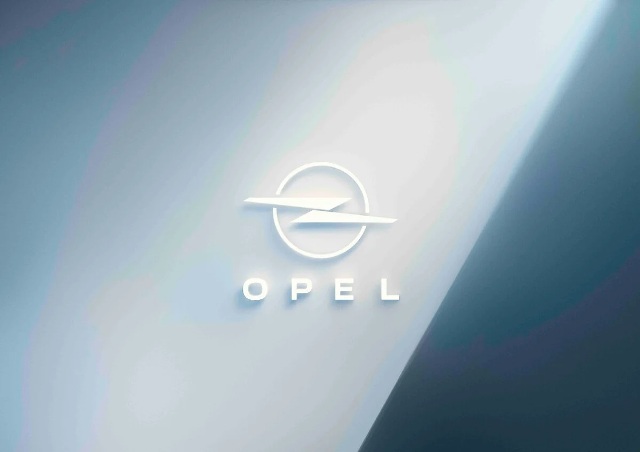
At the IAA Mobility 2023, Opel is once again playing a pioneering role with the latest generation of the compact class bestseller Astra. From September 5 to 10, the new Opel Astra Sports Tourer Electric will celebrate its world premiere in Munich – making it one of the first all-electric estates from a German brand. It offers Opel customers a dynamic, comfortable, extremely practical and, above all, locally emissions-free estate ideally suited for the daily commute or holiday trips with the whole family.The elegant four-seater impresses with a large load compartment, which can easily be doubled by folding down the rear seats. Split backrests that can be folded in at an angle make it easier for passengers to get in; the wide tailgate makes it easy to load and unload work utensils or bulky material. In addition, the booth can take a payload of up to 480 kilograms is possible and is designed so that it can be easily cleaned. However, the Olympia Rekord Caravan does not just prove its efficiency with its design and flexible usability, but also with its 40 hp, economical 1.5-litre engine, which accelerated the estate to a comfortable cruising speed of up to around 115 km/h. This makes the Olympia Rekord Caravan a hit with the customers Read More

Stellantis N.V. and Controlled Thermal Resources Holdings Inc. (CTR) today announced a major investment of over $100 million from Stellantis to advance the development of CTR’s Hell’s Kitchen project, the world’s largest geothermal lithium project with a total resource capacity to produce up to 300,000 metric tons of lithium carbonate equivalent each year. Lithium produced at Hell’s Kitchen will support Stellantis vehicles’ BEV eligibility for consumer incentives under the U.S. Inflation Reduction Act (IRA). Additionally, the companies expanded the initial supply agreement, which now calls for CTR to supply up to 65,000 metric tons of battery-grade lithium hydroxide monohydrate (LHM) each year over a 10-year contract term. This new agreement incorporates the original lithium supply agreement signed by both companies in June 2022 for up to 25,000 metric tons of LHM per year.
CTR’s Hell’s Kitchen project in California’s Imperial County will recover lithium from geothermal brines using renewable energy and steam to produce truly “green” battery-grade lithium products in a fully integrated process. This eliminates the need for evaporation brine ponds, open pit mines and fossil-fueled lithium processing.
“The foundation of our industry-leading decarbonization drive includes low-emissions production and sustainable supply as the building blocks for our electric vehicles,” Stellantis CEO Carlos Tavares said. “The latest agreement with CTR is an important step in our care for our customers and our planet as we work to provide clean, safe and affordable mobility in North America.” As part of the Dare Forward 2030 strategic plan, Stellantis announced plans of reaching a 100% passenger car BEV sales mix in Europe and 50% passenger car and light-duty truck BEV sales mix in the United States by 2030. To achieve these sales targets, the Company is securing approximately 400 GWh of battery capacity, supported by six battery manufacturing plants in North America and Europe. Stellantis is on track to become a carbon net zero corporation by 2038, all scopes included, with single-digit percentage compensation of remaining emissions. Read More
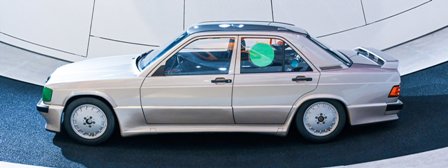
40 years ago, the Mercedes-Benz 190 E 2.3-16 was the new top model in the W 201 series. Its four-valve engine was an entirely new feature: the four-cylinder unit had two intake and two exhaust valves per combustion chamber. It developed an output of 136 kW (185 hp) from a displacement of 2,299 cubic centimetres. The standard version of this sporty “Baby Benz” accelerated from 0 to 100 km/h in 7.5 seconds, and reached a top speed of 235 km/h. This made the sixteen-valve model a star in 1983.
Eight and a half days at 250 km/h: The three cars set several world records on the high-speed track in Nardò, southern Italy, between 13 and 21 August 1983. The fastest 190 E 2.3-16 covered a distance of 50,000 kilometres in 201 hours, 39 minutes and 43 seconds. The average speed was 247.9 km/h. In addition to this achievement, the trio set two more world records over 25,000 kilometres and nine class records.
Reliability: These records provided impressive proof of reliability over extreme distances for the cars, and especially for the four-valve engine of the “Baby Benz”. In this way, Mercedes-Benz was able to make the new engine technology popular. Around four weeks after the record drive, the company presented the 190 E 2.3-16 to the public for the first time at the International Motor Show (IAA) in Frankfurt/Main. Modified: The record-breaking vehicles, which were capable of around 260 km/h, largely corresponded to the production version in terms of technology and appearance. This was especially true of the four-cylinder M 102 engines: they were standard power units with two overhead camshafts and 16 valves, and a standard output of 136 kW (185 hp). Only the injection system and ignition were adapted to the special operating conditions, i.e. driving at a constant high load and an engine speed of around 6,000 rpm. In addition, there was a “performance” camshaft, a smaller radiator and no fan, because at these high driving speeds, the normal airstream was sufficient for a good flow through the radiator. Read More
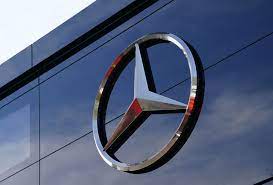
Global trade in counterfeit Mercedes-Benz products continues to grow, especially online. In 2022, there was another significant increase in counterfeiting activities on social media and online marketplaces. Compared to the previous year, the number of removed online offers of counterfeit listings on relevant platforms rose by more than 23 percent to over 155,000 cases. In 2022, a total of more than 1.6 million counterfeit products were seized in over 620 raids. The quality of counterfeit products is usually poor and does not meet the minimum legal requirements in terms of safety. Therefore, counterfeiting is a significant risk to the health and safety of road users. A global team at the Mercedes-Benz Intellectual Property Competence Centre works closely with customs and law enforcement authorities around the world to put a stop to counterfeiters. In addition to the classic targets of product pirates, such as brake discs, wheels and body and steering parts, online platforms will also continue to be under the watchful eye of brand protectors at Mercedes-Benz. This is because counterfeit products can often hardly be visually distinguished from original parts. For the first time in 2022, the number of deleted listings of counterfeit offers on social media and online platforms rose significantly to over 155,000.When trading counterfeit goods, counterfeiting gangs take advantage of the high degree of anonymity and decentralised nature of online marketplaces and technologies. For this reason, Mercedes-Benz is further expanding its strategic and operational measures against counterfeiting in online trade. The brand protection strategy comprises three pillars: detecting, attacking and preventing. For this reason, the brand protectors regularly offer training events and information material to raise awareness, for example for customs authorities or service providers. In order not to fall for counterfeiters, a few simple criteria help consumers when shopping. This starts with the careful examination of conspicuous offers in everyday (online) life. Typical alarm signals for counterfeit products are a significantly low price, abnormalities in product quality or sales via dubious online sources. In some cases, it is immediately apparent from the product images or the designations that they cannot be genuine, since Mercedes-Benz does not manufacture these products at all. Read More

Bentley Motors and The Little Car Company unveil a road-legal, 85 per cent scale recreation of the most famous Bentley in the world. ‘Blower Jnr’, a recreation of the 1929 4½-litre Supercharged Team Car No. 2 in Bentley’s Heritage Collection, is the first road-legal car from The Little Car Company and the most sophisticated city car ever built.
Crafted by hand to the same standards as any Bentley, and adorned with beautiful details all inspired by the original Team car, Blower Jnr is built around a 48V electric powertrain with a 15 kW (20 bhp) motor, meaning a top speed of 45 mph / 72 km/h in the UK and EU (25 mph / 40 km/h in the USA due to legislation) and an expected range of around 65 miles, with tandem seating for two adults. Blower Jnr is a collaboration between The Little Car Company and Bentley’s Heritage Collection. The original Team Car from 1929 – insured for £25m – was used by The Little Car Company to master the design of Blower Jnr, with details recreated at a sizeable 85 per cent scale. The result is a vehicle that will have even experts looking twice – with the car measuring 3.7 metres long and 1.5 metres wide. Unlike The Little Car Company’s other products, Blower Jnr is fully road legal and designed specifically to be used on the road.
A Faithful Homage
Beyond the headline figures, the beauty of Blower Jnr is in the recreation and repurposing of details from the original car.
The frame is painted steel, to which an authentic chassis specification is attached. Leaf springs and scaled-down, period-correct friction dampers bring a comfortable ride, while Brembo disc brakes at the front and drums at the rear provide the stopping power. The electric motor is mounted across the rear axle, while the batteries and drive electronics are all housed in a hidden undertray.
The bodywork is crafted in two sections, and while the rear body structure is crafted in carbon fibre rather than being an ash frame, it’s covered in impregnated fabric, just as the original. The bonnet, with its multiple cooling louvres, is hand-crafted in aluminium using traditional techniques and fastened with beautiful leather buckled bonnet straps. The two-person cockpit is in a 1+1 layout, with a central adjustable driving position and the passenger travelling behind in the rear seat. An optional bespoke weekend bag fits behind, in the scaled down and repurposed fuel tank complete with lockable latch.
At the front of the car, the supercharger now houses the charging port that connects the onboard charger to any Type 1 or Type 2 socket. It’s surrounded by the famous Bentley mesh grille, in an authentic nickel-plated radiator housing. Read More
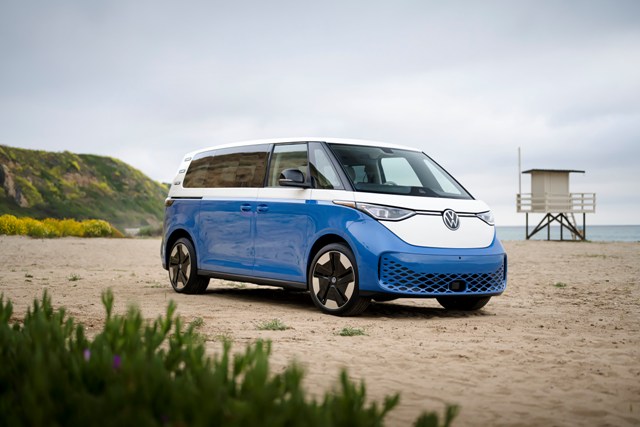
Volkswagen of America (VWGoA) announced that the three-row ID. Buzz will appear at the Pebble Beach Concours d’Elegance during Monterey Car Week. Revealed in Huntington Beach, California in June, the three-row ID. Buzz has brought one of the greatest automotive icons ever—the VW Microbus—to the era of electric mobility.
The three-row ID. Buzz, tailored specifically for North America, will be on display as part of Volkswagen Group of America’s sponsorship of the Pebble Beach Concours d’Elegance. The vehicle will be on display on the upper lawn at The Lodge at Pebble Beach™ from the afternoon of Saturday, August 19 through Sunday, August 20.
The three-row ID. Buzz will be the latest addition to Volkswagen of America’s growing fleet of all-electric vehicles. The short wheelbase and cargo vehicle configurations are already available in Europe, and the long-wheelbase three-row model is planned for sale in the North American market starting in 2024.
As with the original Bus, the three-row ID. Buzz has a rear-mounted powerplant as standard, providing great traction, performance and agility. The rear motor produces 282 horsepower, in comparison to the two-row European-spec model, which debuted with 201 hp. The battery is also larger at 91 kWh (gross), compared with the two-row model’s 82 kWh battery. The efficient skateboard design—with the battery mounted in the floor—not only saves space, but also contributes to better handling by locating a large percentage of the vehicle’s weight low down in the structure. All-wheel drive is available for the three-row ID. Buzz at launch, with about 330 hp and dual motors. Retro cues throughout are a throwback to the original Bus, while reinterpreting the design for the future. The iconic oversized VW logo is illuminated, with a light line that extends to either side, connecting to the LED headlights. Bold exterior colors, with an available two-tone color palette, include many found on the two-row ID. Buzz—Energetic Orange, Pomelo Yellow and Mahi Green, for example. Others, such as Cabana Blue, Metro Silver, and Indium Grey, are all-new. Read More
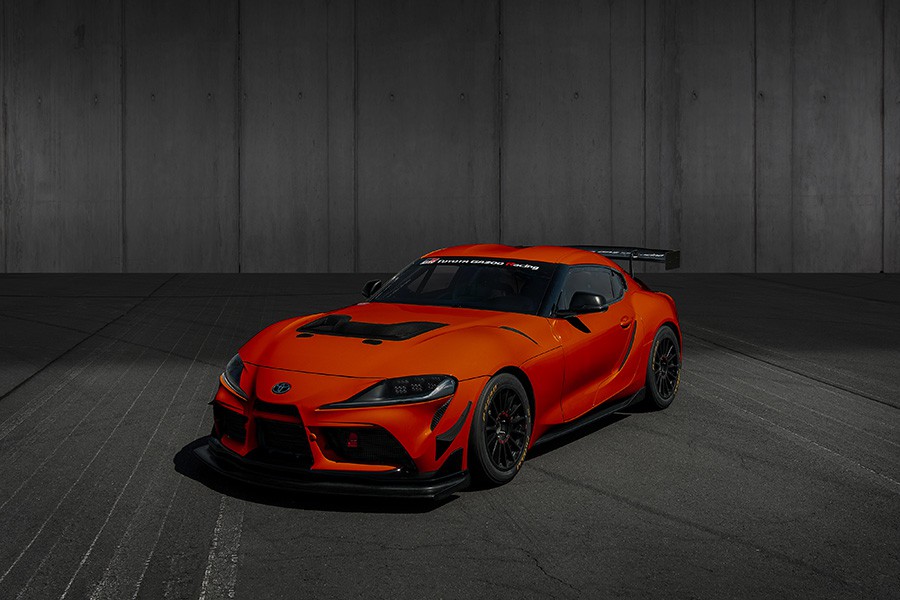
Toyota GR Supra has captured the fun-to-drive spirit of TOYOTA GAZOO Racing. Since it was relaunched in 2019, the fifth generation (MkV) model has earned a reputation for offering balanced handling and punch-above-its-weight performance, all while honoring its legendary place in Toyota’s sports car lineage. For 2024, the GR Supra lineup keeps the celebration roaring.
For starters, a 45th Anniversary Edition adds a GR Supra model to the lineup with a nod to the past. Paying tribute to the Supra’s place in pop culture, it’s available in a choice of fiery orange Mikan Blast or icy white Absolute Zero and equipped with an elevated gloss black rear spoiler, standard. Built on the 3.0 Premium grade, it wears 19-inch matte black wheels, features a black Supra side decal, and is available in a choice of Manual or Automatic Transmission (MT or AT), so it’s sure to turns heads while delivering smooth, satisfying shifts around the corners.
The 45th Anniversary Edition joins the already performance-packed lineup of 2.0- or 3.0-liter engine equipped GR Supra models. Drivers can choose from the GR Supra 3.0 or 3.0 Premium grades, powered by an inline six-cylinder turbocharged engine that outputs 382-hp and 368 lb.-ft. of torque or the GR Supra 2.0 grade with an inline 4-cylinder engine that outputs 255-hp and 295 lb.-ft. of torque. The 2.0 model does shave a bit of weight off the scales, with a curb weight that is about 200 pounds less than the 3.0 grades.
With an engine that produces high torque at high rpm, the GR Supra retains the eagerness to rev with turbine-like smoothness, delivering a manufacturer estimated 0-60 time of 3.9 seconds in the 8-speed AT and 4.2 seconds in the MT 3.0 models and 5.0 seconds in the 2.0 grade. Even with all that power, GR Supra 3.0 grades equipped with the AT will achieve a manufacturer estimated 26 mpg combined (25 city/31 highway/27 combined), with the Supra 2.0 achieving a manufacturer estimated 27 mpg combined. Fuel economy is due in part to standard start/stop technology, which shuts the engine off while the car is at rest. Read More

TREMEC, a subsidiary of KUO, announced the acquisition of an innovative provider of plug-and-play EV conversion systems, Electric GT, Inc. The acquisition will enable TREMEC to strengthen its product offerings in the rapidly growing ICE-to-BEV vehicle conversion market. The newly branded company, TREMEC – Electric GT, will be based out of Electric GT’s headquarters in Huntington Beach, CA, and will report directly to TREMEC leadership with access to TREMEC’s global resources. Globally, an increasing number of builders and independent installers are converting traditional ICE powertrains to electric power in classic to late-model vehicles and specialty commercial applications. Customers are searching for increased performance, while others want an environmentally friendly solution to extend their classic vehicles’ life. The TREMEC – Electric GT system solution provides the customer with all the components necessary for the conversion, including batteries, cabling, drive motors, inverters, gearboxes, and the control systems necessary to install and operate the system safely and effectively.TREMEC is developing solutions for electric drive units (EDUs) for the OEM, specialty vehicles and aftermarket segments. The TREMEC EDUs provide advanced motor and inverter technology combined with TREMEC’s 60 years of experience designing and manufacturing gearboxes. The result is the most power-dense EDUs available in the market, developed to the quality standards of production vehicles and supported by TREMEC’s engineering and manufacturing teams. Read More
| Oil and Gas Blends | Units | Oil Price $ | change |
| Crude Oil (WTI) | USD/bbl | $80.48 | Up |
| Crude Oil (Brent) | USD/bbl | $84.13 | Up |
| Bonny Light | USD/bbl | $86.63 | Down |
| Saharan Blend | USD/bbl | $85.02 | Down |
| Natural Gas | USD/MMBtu | $2.58 | Down |
| OPEC basket 17/08/23 | USD/bbl | $ 86.17 | Down |
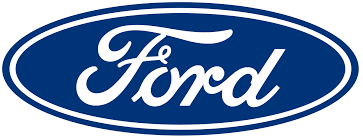
SK On, EcoProBM and Ford are announcing an investment of C$1.2 billion to build a cathode manufacturing facility that will provide materials that ultimately supply batteries for Ford’s future electric vehicles. Once production begins in the first half of 2026, the site will have the capacity to produce up to 45,000 tonnes of CAM per year. This new facility – Ford’s first investment in Québec – is part of the automaker’s plan to localize key battery raw material processing in regions where it produces EVs. “Ford has been serving customers in Canada for 119 years, longer than any other automaker, and we’re excited to invest in this new facility to create a vertically integrated, closed-loop battery manufacturing supply chain in North America designed to help make electric vehicles more accessible for millions of people over time,” said Bev Goodman, president and CEO, Ford of Canada. “We’re excited for the opportunity for our first-ever investment in Québec with a new facility that will help shape the EV ecosystem there.”
EcoPro CAM Canada LP will manufacture cathode active materials and, more precisely, high quality Nickel Cobalt Manganese (NCM) for rechargeable batteries that are targeting greater performance levels and improved EV range compared to existing products, thanks in part to EcoPro’s core shell gradient (CSG) technology.
Construction has begun on the 280,000 square-meter (or more than 3 million square-feet) site and will include a six-floor building that will house approximately 345 new jobs for Canada Read More
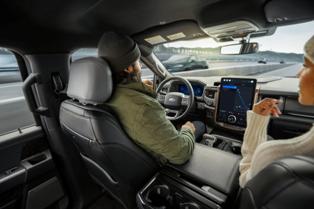
Ford’s hands-free highway driving technology. Ford now is including BlueCruise hardware standard from the factory to provide flexibility and choices to more customers.
Now, customers with equipped vehicles can choose to activate BlueCruise at any point during their vehicle ownership journey – at purchase, annually or even monthly – as well as have the opportunity to experience it through a complimentary trial if they choose not to activate at purchase. Ford is projected to install BlueCruise hardware on 500,000 vehicles for the 2024 model year in North America across Ford and Lincoln – expanding the availability onto more electric and gas-powered vehicles. Ford customers who know and love BlueCruise can choose to order or purchase a vehicle with BlueCruise already activated for three years. It can be rolled into the financing as part of the vehicle purchase. For customers who want to try out BlueCruise first, they can use BlueCruise for 90 days from vehicle purchase during a complimentary trial. At the end of the trial or at any point during their vehicle ownership, customers can activate it on an annual or monthly basis. Plus, to meet the needs of active or occasional users, there is no minimum length commitment required to activate it. For example, a customer could activate the service for one month for a road trip and not activate it again for another year. Read More

Oil and Gas News Undiluted !!! �The squeaky wheel gets the oil�
OilandGasPress Energy Newsbites and Analysis Roundup | Compiled by: OGP Staff, Segun Cole @oilandgaspress.
Disclaimer: News articles reported on OilAndGasPress are a reflection of what is published in the media. OilAndGasPress is not in a position to verify the accuracy of daily news articles. The materials provided are for informational and educational purposes only and are not intended to provide tax, legal, or investment advice.
Information posted is accurate at the time of posting, but may be superseded by subsequent press releases
Please email us your industry related news for publication info@OilAndGasPress.com
Follow us: @OilAndGasPress on Twitter |
Oil and gas press covers, Energy Monitor, Climate, Renewable, Wind, Biomass, Sustainability, Oil Price, LPG, Solar, Marine, Aviation, Fuel, Hydrogen, Electric ,EV, Gas,

